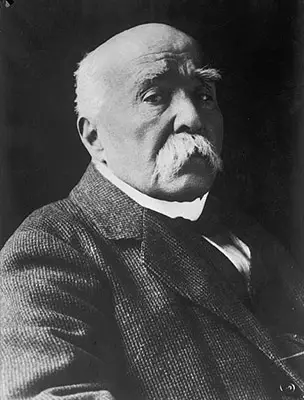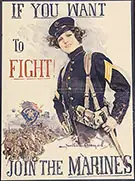Georges Clemenceau
Georges Clemenceau was born on September 28, 1841 in Mouilleron-en-Pareds Vendee, France. His father was Benjamin Clemenceau, a physician by name but was not a regular practicing one. His father however was very active in political activism. The elder Clemenceau did not agree with the way of things at the time and was involved rebellion causes. This mindset would be very formative for young Georges as he grew.
Georges father was a well-read fan of the works of Voltaire, a French writer who was considered one of the most intelligent men of his time. Benjamins passion for the Revolution of 1789 would reflect into the life of Georges as he grew older. Young Georges would come to meet men like historian Jules Michelet that were bent on the overthrow of Empower Napoleon of France.


During a period in of 1858 when Benjamin was arrested and in prison for his activist causes, Georges would attend college in Nantes Lycee. He received his baccalaureate of letters from that institution. After his father was received from jail, the two would head to Paris where Georges would continue his education in that of medicine.
It was in Paris that Georges made association with a number of young men that were part of a group known as Agis Comme Tu Penses, which translated means Act as you Think. The organization was organized as opposing the current ruler class of France. Here he would twice develop news journals that spelled political activism to resist the ruling authority. The idea was to get the workers of France to stand up and resist the present conditions that existed.

The paper was twice printed and both times French authorities seized the publications. Because of an ad in in one paper, Georges was arrested and spent time in jail. Upon his release he would start a new paper but was once seized by the police. Georges political mindset of things was now forged into him and would play a part in his future direction.
Georges moved to the United States to practice medicine and was there during the period of the Civil War. The open discourse of politics that existed in the United States impressed Georges immensely ad truly admired those that were involved in true democracy. While in America, Georges taught at a girl’s school, where he met and married Mary Plummer and had three children.

Georges returned to France where he would head into the political realm. When Napoleon was overthrown in 1870, Georges Clemenceau won election to become Mayor of Montmartre in Paris. In 1876, he would become a member of the French Parliament. France had just lost the Franco-Prussian War and grew to not trust Germany in respect. He was determined that Germany would push for an aggressive posture again and he would be proven correct.
By 1906, Clemenceau became Prime Minister of France and remained convinced that Germany was bent on aggression. He moved towards improving alliances with nations such as Russia and Britain that also believed in a German incursion at some point. He also moved to improve the military strength of France during the next few years.

When WWI broke out in 1914, France would see the admonitions of three Prime Ministers in the first three years pass away. None of these men had the stomach to stay the course in its fight against Germany. Georges Clemenceau was asked by French President Raymond Poincare to step in and see the fight to the end. Georges agreed and would set in motion the strength and determination to see victory come for France and the Allies.
Poincare was pleased with his decision to bring in Clemenceau and the two remained convicted to see victory happen. The darkest days of the war with the German Push of Spring in 1918, was a hard time for France. Clemenceau, who had the nickname of the Tiger, did all he could to make sure his army had supplies and munitions to carry on the battle. It was said he broke down emotionally when the Germans finally agreed to surrender later that year.

The Peace Treaty of Versailles saw an elderly Clemenceau stand along with U.S. President Woodrow Wilson and Prime Minister David Lloyd George of Britain.
Georges Clemenceau passed away on November 24, 1929.



